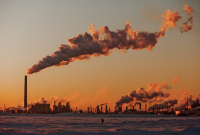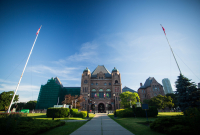Support strong Canadian climate journalism for 2025
The lifting of Alberta’s COVID-19 state of emergency does not mean the province will ask the oilpatch to resume environmental monitoring.
The Alberta Energy Regulator suspended requirements for all oil and gas companies in the province to report environmental data in May, citing the COVID-19 crisis. On Tuesday, the regulator confirmed those suspensions would remain in place even though the province ended its state of public health emergency on Monday.
“There are a whole bunch of things opening up … But we can’t get two people going onto a site to do environmental monitoring?” said Dale Marshall of the green non-profit Environmental Defence.
“This continues to be a pretty flimsy excuse to make an ideological, anti-environmental decision.”
In an update posted to its website Tuesday, the regulator said environmental monitoring won’t resume until the government lifts public health orders around physical distancing and travel.
“The temporary suspensions will continue to remain in place as we work with government to understand their next steps,” the notice read.
The AER did not answer questions from National Observer about why the suspension is still necessary if the state of emergency is over.
Jess Sinclair, a spokesperson for Alberta Environment Minister Jason Nixon, didn’t answer when asked why the suspension is still needed. But Sinclair pointed to past statements saying the monitoring that’s now temporarily on hold is low-risk, and companies are still required to report it when they break the law.
“If there isn’t an emergency anymore … then it just makes sense that those conditions be put back in place as soon as possible,” said Jason Unger, the executive director of the non-profit Alberta Environmental Law Centre.
Ontario, which also suspended some environmental protection measures in the early stages of COVID-19, restored them this week.
Scientists, First Nations have criticized suspension
The Alberta government first suspended some environmental monitoring with a March 31 order from the environment minister, saying it would cause companies “hardship” to force them to comply during a pandemic.
The Alberta Energy Regulator — a provincial agency that oversees oil, oilsands, natural gas and coal projects — added environmental monitoring exemptions for the oilsands in May. Later, as the province started lifting COVID-19 restrictions with the reopening of golf courses and dental services, it broadened the exemption to include the entire oil and gas industry.
Now, companies no longer need to monitor groundwater, soil, fumes, wildlife, tailings ponds, and more. The government and the regulator have said the monitoring that was halted is “low-risk,” and that it would have been dangerous to have people going in and out of areas to do the work.
The Mikisew Cree, Fort McKay and Athabasca Chipewyan First Nations have appealed the suspensions to the regulator’s internal review body, saying the decision was “shocking,” done without consultation and wasn’t explicitly linked to COVID-19. The Opposition Alberta NDP have also called for the head of the AER to resign over the suspension.
A dozen environmental groups and Indigenous organizations wrote to federal Environment Minister Jonathan Wilkinson last week to ask him to intervene. And this week, Alberta’s top scientist said he wasn’t consulted, while the Alberta Society of Professional Biologists said it was possible to do environmental monitoring while respecting physical distancing.
Some of the suspensions included time limits, meaning much of the environmental monitoring that’s on hold right now is set to resume in the fall, Unger said. But other changes could remain longer, he added.
“Without clear guidance from the regulator as to when that will happen, that’s kind of up in the air,” he said.
Many types of environmental monitoring are part of the conditions on companies' permission to operate. Though the data may be classified as low-risk, decision-makers thought this work was important enough to mandate it, Unger said.
Unger also added that the longer the suspensions continue, the larger the data gap that will result. Particularly with some kinds of wildlife monitoring, he said, scientists could miss their window to observe certain species if the work only resumes after the summer.
“What are we giving up by not having those monitoring programs in place?” he said. “The question I would have is, just, what’s the plan?”






Comments